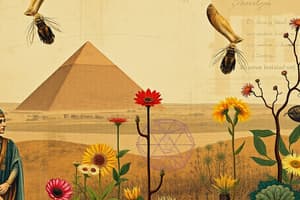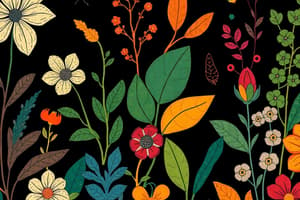Podcast
Questions and Answers
Which plant species is believed to be an emollient and laxative?
Which plant species is believed to be an emollient and laxative?
- Alcea rosea
- Alisma plantagoaquatica
- Common hollyhock (correct)
- Aesculus hippocastanum
What is the name of the toxin in Alcea rosea that causes a sometimes fatal condition?
What is the name of the toxin in Alcea rosea that causes a sometimes fatal condition?
- Allantoin
- Anthraquinone
- Glucomannan
- Tremetol (correct)
What is the purported benefit of using Allium sativum?
What is the purported benefit of using Allium sativum?
- Healing burns and wounds
- Lowering blood cholesterol and high blood pressure (correct)
- Treating arthritis and muscle pain
- Treating constipation
What is the function of the smoke from the leaves of Alcea rosea?
What is the function of the smoke from the leaves of Alcea rosea?
What is the use of Aloe vera leaves?
What is the use of Aloe vera leaves?
What part of the Aesculus hippocastanum plant is used medicinally?
What part of the Aesculus hippocastanum plant is used medicinally?
Which plant is used to treat urinary tract issues?
Which plant is used to treat urinary tract issues?
What is the common name of Actaea racemosa?
What is the common name of Actaea racemosa?
What is the benefit of using Amorphophallus konjac?
What is the benefit of using Amorphophallus konjac?
Which plant has been used historically as both a food and a medicine?
Which plant has been used historically as both a food and a medicine?
Flashcards are hidden until you start studying
Study Notes
Medicinal Plants and Women's Role
- Women have traditionally been the main producers of plant-based medicinal products, conserving economically important plant species.
- In India, which is home to nearly 45,000 species of medicinal plants, only 60 species are commercially used.
Importance of Medicinal Plants
- Medicinal plants provide crucial livelihood options for millions of rural people, especially tribal communities and women.
- The collection, processing, and trading of medicinal plants contribute significantly to the family income of the poor.
Traditional Knowledge and Medicinal Herbs
- Traditional knowledge associated with medicinal herbs and cultivation is a highly gendered activity in most countries.
- Women play a crucial role in the innovation, preservation, and cultivation of medicinal herbs.
Health and Medicinal Plants
- Medicinal plants are playing a crucial role in reducing the cost of healthcare and maintaining health.
- The use of medicinal plants can help alleviate the burden of high blood pressure and diabetes, which affect 1/4th of adults in India.
Medicinal and Aromatic Plants (MAPs)
- MAPs constitute an integral part of biodiversity, ecosystem, and biological heritage.
- MAPs are used in traditional and recognized systems of healthcare, pharmaceutical, and cosmetic industries.
- They are also used as sources of natural dye, fat, essential oil, bio-pesticide, resin, protein, vitamin, condiment, spice, timber, fiber, and other useful substances.
Livelihood Systems and Medicinal Plants
- MAP-based livelihood systems are often mediated by market forces and directly related to employment and income of the poor.
- Research by the International Development Research Centre (IDRC) suggests that MAP-based livelihoods can be made socially equitable and gender-balanced.
Examples of Medicinal Plants
- Angelica archangelica: used to treat obesity, constipation, and reduce cholesterol.
- Althaea officinalis: used historically as both a food and a medicine.
- Aloe vera: used to heal burns, wounds, and other skin ailments.
- Allium sativum: purported to lower blood cholesterol and high blood pressure.
- Alisma plantagoaquatica: used for the urinary tract.
- Common hollyhock: believed to be an emollient and laxative.
- Alcea rosea: used to treat diarrhea, kidney stones, and fever.
- Aesculus hippocastanum: used to treat joint pain, bladder and gastrointestinal problems, fever, and leg cramps.
- Actaea racemosa: used to treat arthritis, muscle pain, menopause, and menstruation-related conditions.
Studying That Suits You
Use AI to generate personalized quizzes and flashcards to suit your learning preferences.




